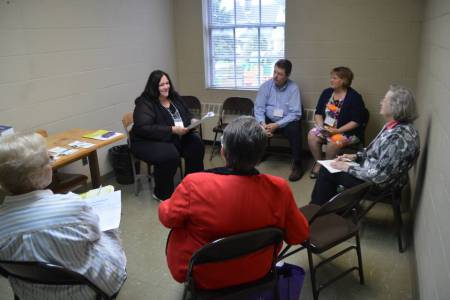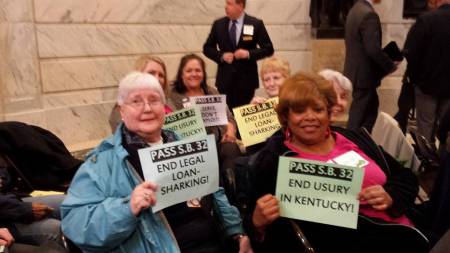By Aaron Weaver
In the Appalachian foothills of southeast Kentucky, Scarlette Jasper, one of the Cooperative Baptist Fellowship’s field personnel, is working to educate others about the debt trap that is predatory lending.
Jasper, who was commissioned by CBF in 2014 and serves through the Fellowship’s rural poverty initiative, Together for Hope, ministers alongside the homeless, victims of domestic violence and families in financial and medical crisis in communities plagued by generational poverty.
She leads workshops on predatory lending and provides low-income families with financial counseling, offering education on how to protect themselves from the debt trap as well as how to escape from it.

“What we try to do is educate people about exactly what predatory lending is, and the price that they’re paying, the cost of those payday loans,” Jasper said. “We try to help them work through other avenues rather than having to resort to going to that toxic facility for assistance.”
Jasper points those in need to alternative options, and when they’ve become trapped in a payday loan, she offers assistance.
“We try to help them learn how to budget, how to get those loans paid off even if it means you can’t pay down the whole loan at once, requiring them to take out another loan,” she said. “We try to say, ‘well, if you absolutely have to take out a new loan to pay the old loan off, what’s the minimum that you can get by with?’ — so that the loan is not just growing and growing and getting out of control.”
Jasper has seen firsthand how predatory lenders target low-income families, making it as easy as possible to trap those most vulnerable in a cycle of debt in rural areas where financial resources are limited. Many of these families feel a sense of shame for having to take out these short-term usurious loans, she said.
“There’s a lot of marketing that goes along with these type of [predatory] loans and it’s really targeted towards the families that it’s going to hurt the most — low-income families that can’t afford the high interest rates,” Jasper said. “There’s a stigma attached to it.”
For nearly 25 years, Jasper has been involved in nonprofit volunteer work, serving others and bringing her faith to the workplace.
“From the time I was a child, I had a call to do service, to serve others,” she said. “It’s not work that was modeled to me; I didn’t know anyone who did that kind of work. But I have always had a desire to help others.”
Jasper decided to partner with CBF because of the Fellowship’s commitment to renewal and forming together as a larger community of faith.
“I sought out CBF because I really love the Fellowship’s philosophy of partnering together,” she explained. “So many times everybody wants to reinvent the wheel and do it all themselves for their glory, but CBF is about working together because we can do so much more when we work together — as an organization, as churches, as individuals — than we can alone ….”
Jasper, who is also a full-time student at Baptist Seminary of Kentucky, encourages churches and Christians to help end the debt trap in their communities and speak out against the problem of predatory lending.

“Be an advocate for these families,” Jasper said. “Advocate for lower interest rates. If we went into a bank and they told us that the interest rate for a loan was going to be 400-plus percent, we wouldn’t hesitate to turn around and walk out because you see that number and know that it is an astronomical amount.”
But that isn’t how the payday model works, she said. Customers there don’t see the actual costs.
“So, advocating for interest rate caps is an absolute must,” she said. “Advocate within your community, with your state government and at the national level.”
Education is also important, she said.
“Educate your community and the people that are being targeted by these predatory practices,” she added. “Education and advocacy are two things that we can do as individuals and our churches can do too.”
